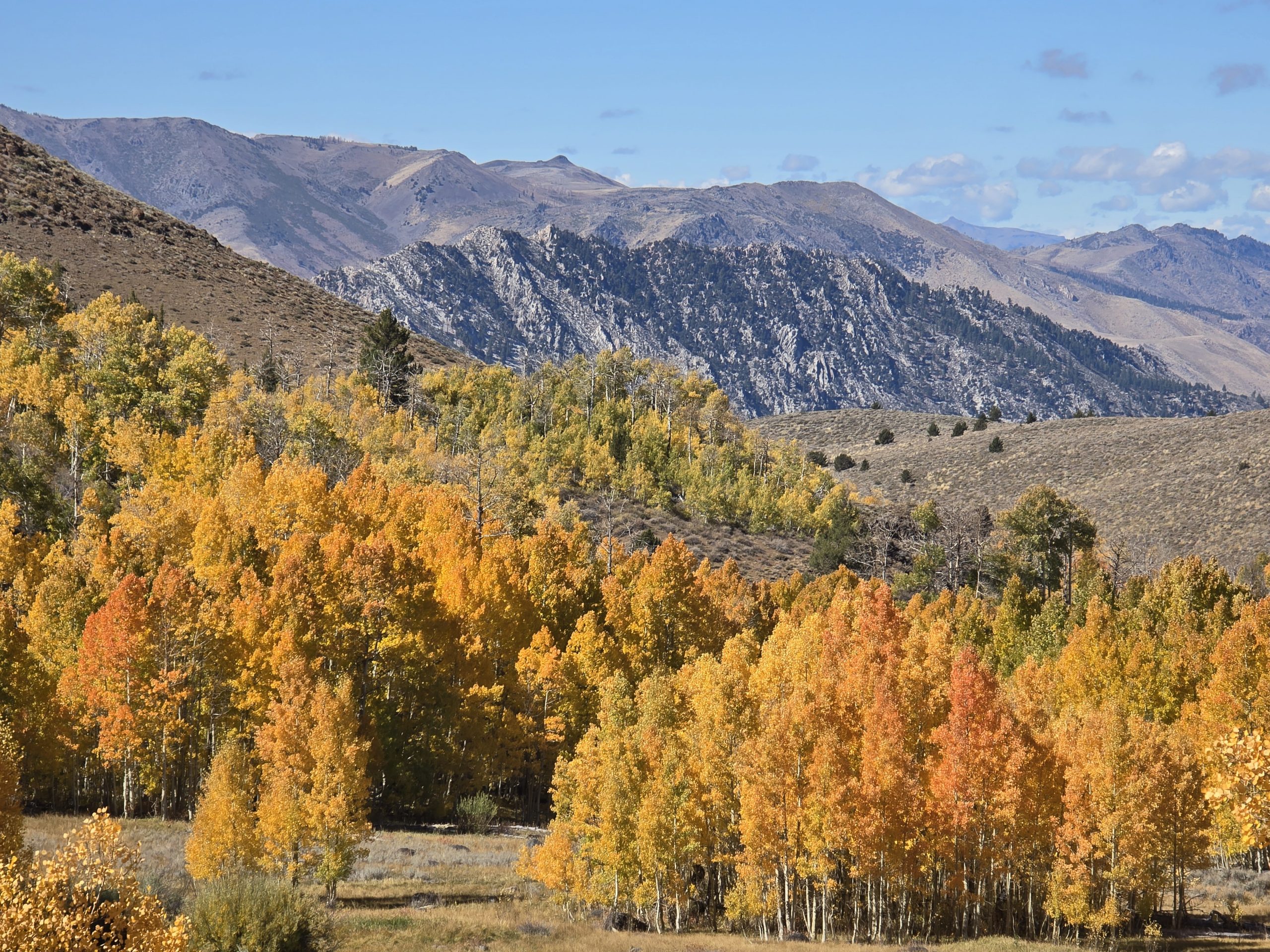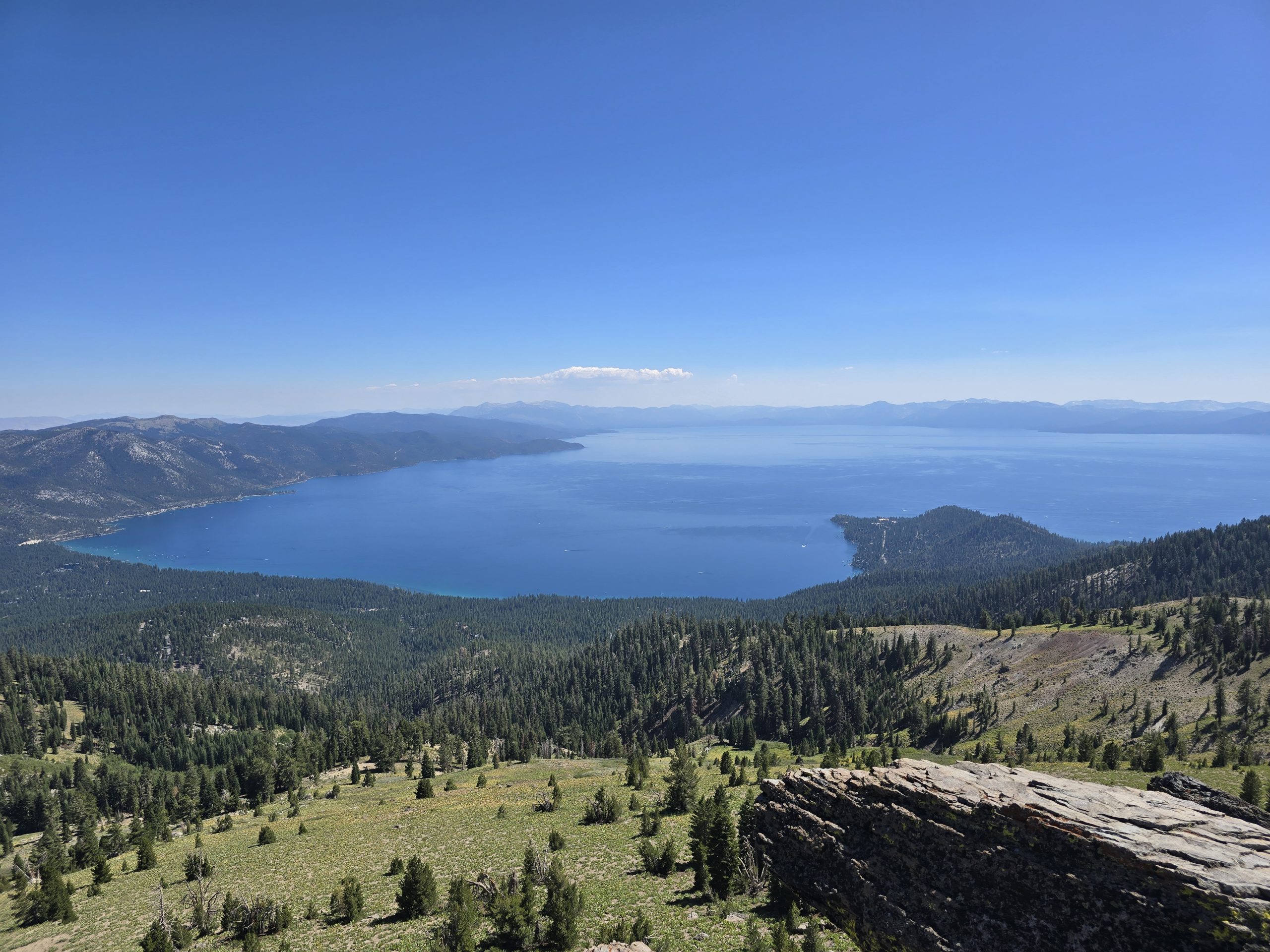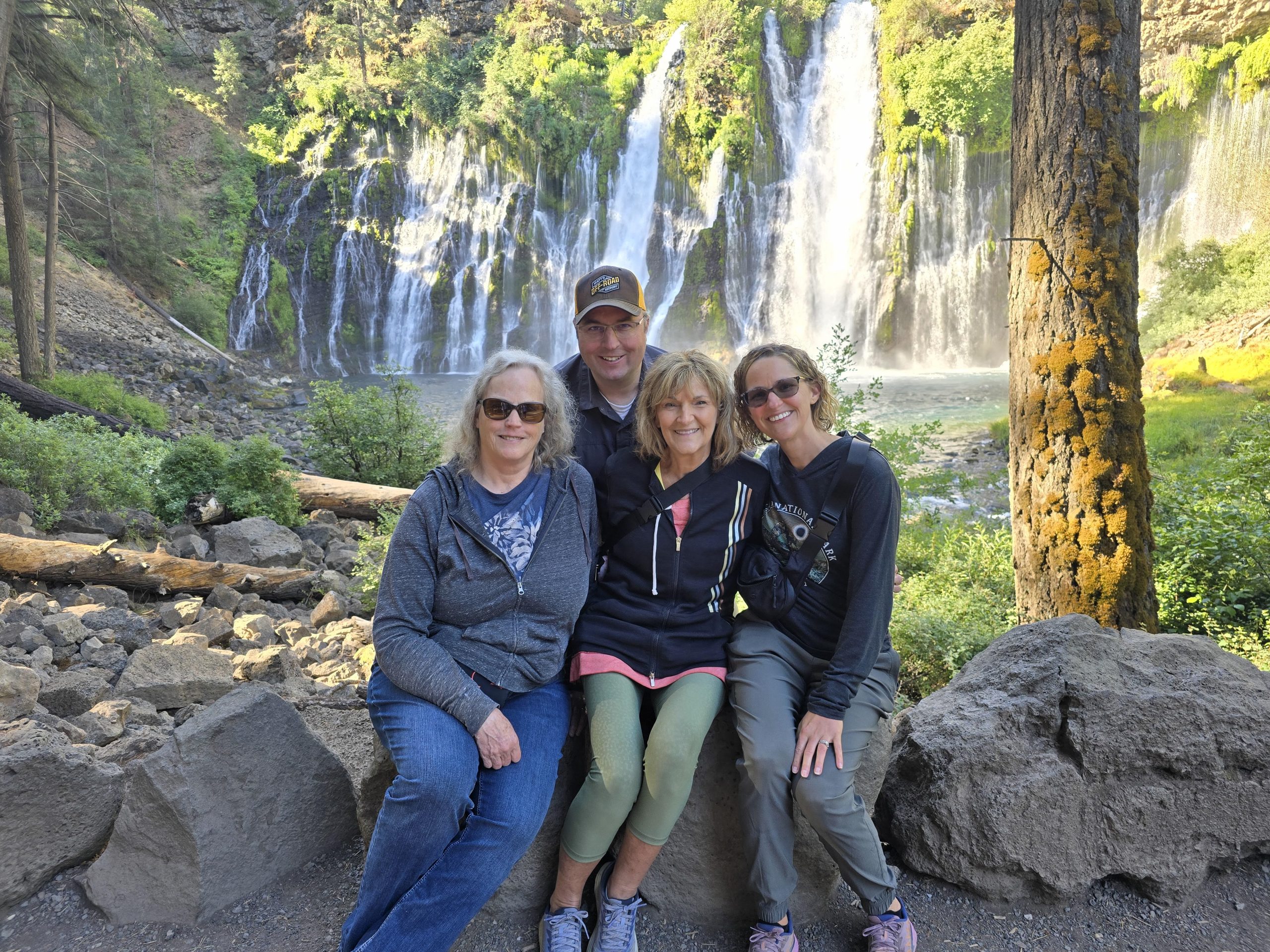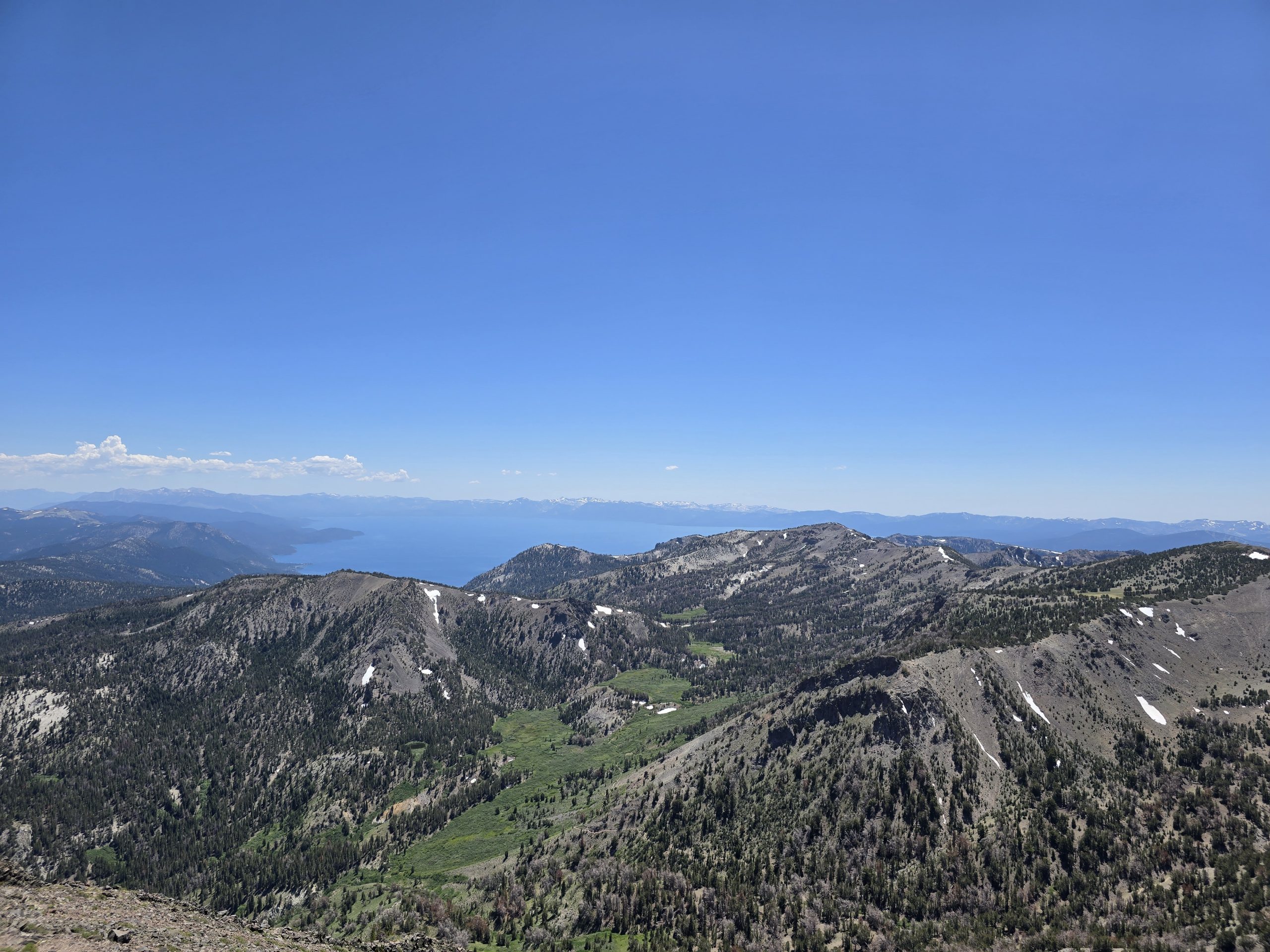Jump to:
The past few years, we’ve met up with our friends from Wisconsin, Chad and Shannon, for a week of hiking, sightseeing, monster cookies, venison jerky, Seinfeld and movie references, laughing, and overall ridiculousness, not to mention a bunch of memories and inside jokes.
My husband has known Chad since 2002 when they worked together in Minnesota. When we still lived there, we’d cross paths a few times over the years, and then lives got busy and then we moved 1,900 miles away to Lake Tahoe.
Sometime between 2014 and 2015, Chad called my husband and the trip-planning began. In April 2015, Chad and Shannon came to visit for their inaugural introduction to Lake Tahoe, which kicked off their adventures with us.
We’d only been living in Tahoe for a couple of years at that point, so our experience wasn’t vast; we only knew of a few fun places to take them: Hiking around Horsetail Falls in Desolation Wilderness, and on the west shore’s Rubicon Trail, along with some sightseeing at Emerald Bay and Sand Harbor State Park. In hindsight, a pretty tame trip, followed by another relatively tame trip to Tahoe in 2016, where we did some lower elevation hiking on Steven’s Trail and saw our first banana slugs.
Then Chad and Shannon returned to Tahoe a third time in 2019, where we upped the ante after we realized that nothing was a big enough challenge for Chad, so we did our crazy snowshoe hike up to Incline Peak. And even that didn’t break him; in fact, I’m convinced it only emboldened him.
Then, we’d planned a trip together to Zion and Bryce national parks for spring of 2020, but everything got shut down and, much to our dismay, we had to cancel. That trip eventually got rescheduled for spring of 2023 and we had a blast.
As soon as that trip ended, we started planning our next trip together to Moab, Arches, Canyonlands, Capitol Reef, and Mesa Verde. And as soon as that trip ended, we started talking about where we were going next.
Fast forward… 10 years(!) after their first trip to Tahoe, we took our third national park trip with Chad and Shannon. This time, we ventured “up north” to Olympic National Park on the Olympic Peninsula of Washington State in the Pacific Northwest.
Packing Gear for Hiking in Olympic National Park
Seeing as the bulk of our hiking experience is in the dry Sierra (sometimes in snow), or in the even drier southern Utah desert, it took some research and planning to determine what to pack (and what to leave behind) and how to outfit for this trip to the Pacific Northwest (PNW), which is notoriously wet, damp, windy, and relatively cool this time of year. Not to mention, some areas we’d be hiking through are temperate rainforests.
Because Olympic National Forest and Olympic National Park cover a combined nearly 2,000 square miles (1,550,765 acres), and the weather near the ocean side can differ from the inland weather, etc., even previewing the extended weather forecast for the week was only marginally helpful. Regardless, it only showed notable rain on two of the days we’d be there, but in all, not a ton of sun, as it was supposed to be mostly gray and cloudy, and high temperatures were looking like 50s, maybe some 60s.
Ah, so what to pack… I actually really dislike packing for trips, especially to other parts of the country when I don’t exactly know what I will be most comfortable in, while avoiding overpacking or underpacking. So, this one was a challenge for me. I also try to avoid purchasing special gear for one trip (or one hike) that I likely may never use again; however; the last thing I wanted was to find myself extremely uncomfortable and not enjoying hiking or being outdoors on this trip. So, I had to find a balance somehow.
Rain Jackets
We have rarely hiked in rain up until this point, so we’ve gotten by with our cheap, emergency rain ponchos that we carry in our packs, but I was not about to rely on that for hiking a week in the PNW. I managed to convince my husband that I wanted to get a true rain jacket for this trip, because I knew that if I got wet and it was windy or cold out, it would be game over for me. So, we went to Scheel’s and each bought rain jackets. (In the end, I think we were both really glad we did.)
Merino Wool Layers
Through some other research I’d done before the trip, I decided that I needed to be more strategic about layering. So, I also bought a 100% merino wool sweater from Duckworth. I figured this would pair nicely under my rain jacket if the temperatures were low or the dampness set in. Let me just say, I was very impressed with this sweater. I wore it almost every day of our trip. It kept me warm when I know I should have been chilled.
A surprise to me, I also did not end up needing my leather choppers very much, though I also kept those and my wool stocking hat in my pack at all times.
Footwear
I was also torn about which footwear to pack. I definitely wanted my normal Hoka trail runners that I have been hiking in for the past five years, but with the wet, muddy, and possibly snowy trail conditions, I also felt compelled to bring my Oboz waterproof hiking boots, which I have only worn a dozen times or so. (And I did wear these on one of the hikes.)
My husband thought bringing our Keen sandals might be useful for our planned tide pool excursion, so I also packed those (but I ended up not wearing mine at all; however, both of the husbands wore theirs at the tide pools – I just had to be a bit more cautious about where I stepped to avoid getting wet feet).
Outside of clothing choices to be made, I also decided to keep my microspikes in my pack in case we got to any higher elevation hikes and still had to contend with snow/ice – or even mud, as we found microspikes quite useful for traction in slick mud while hiking in Bryce Canyon. (We ended up not needing our microspikes on our April PNW hikes.)
In the end, some overpacking occurred, but overall, I was happy to have the key items I ultimately chose to bring.
Tahoe to Olympic Peninsula
Saturday morning came and we woke up to snow in Tahoe, which is funny because that is exactly how last year’s trip to Moab with Chad and Shannon started out for us.



We’ve only flown from Reno to SeaTac twice now on Alaska Airlines, and both times, we’ve deplaned (and boarded) via the tarmac at SeaTac, which is always a memorable occurrence.

So, Saturday afternoon, we all landed at SeaTac around the same time, grabbed our luggage, and then hopped on the shuttle bus to pick up our rental vehicle for the week.
We were all of about 20 minutes officially into this trip, and my introvert husband had already struck up a conversation with a random stranger (who happened to be wearing a Minnesota shirt) while Chad was verifying that the rental car company, in fact, held the reservation they took some months prior (see Seinfeld reference here.)

Fortunately, we got exactly what we needed for our rental vehicle, and much to our surprise and amusement, when the vehicle rolled up, it had Minnesota plates. 😂
SeaTac to Forks, WA
We hit the road and headed for the 3.5-hour drive from SeaTac to what would be our Olympic National Park basecamp – Forks, WA.

Making our way around Puget Sound, and then stopping at the busy Butcher & Baker Provisions in Port Gamble, we had a delicious late lunch while enjoying our time on their patio.
We navigated road closures through Port Angeles, WA, on Salish Sea, weaved in and out along the south shore of picturesque Lake Crescent, and made the final stretch to Forks, a small, rural community on Hwy 101 with fewer than 3,500 residents.

By the time we located our vacation rental house and loaded up on some groceries for the week from the “Thriftway / Bakery/Deli/Espresso / Forks Outfitters / Ace Hardware & Sporting Goods” store, we were all pretty exhausted from the long day of travel, but we were also kind of hungry for a late dinner. Everything in town seemed to be closed up for the night already, so Shannon went back to Thriftway before it closed to get a couple of frozen pizzas to tide us over, and then we called it a night. The next day’s itinerary would be jam-packed.
Lake Quinault Area & Quinault National Recreation Trail System
Driving south from Forks on Hwy 101 and then west over to the Lake Quinault area, we kicked off our trip with Road Closed barricades on South Shore Road en route to Bunch Falls. Let’s just say we drove as far as we could. Then it became glaringly obvious why the road needed to be closed.



So, we turned around and found a pretty little rock bar along the shore of the Quinault River, where we took in the beautiful mountainous sights and skipped smooth rocks across the river.



On our way back, we stopped at the roadside waterfall we saw along South Shore Road on our way out to the washout.
Merriman Falls
Right along South Shore Road is pretty Merriman Falls, which doesn’t require hiking, but you can climb around the falls to get a closer look and take it in from different angles. Tree branches in the gully are dripping with lichen and the rocks and fallen logs are coated in mosses. Various types of fresh green ferns spring up everywhere.


World’s Largest Sitka Spruce Tree

After visiting Merriman Falls, we headed towards the trailhead for the World’s Largest Sitka Spruce Tree, where we had a quick tailgate lunch before heading out to see this renowned thousand-year-old tree. The trail out to the tree is a short and easy 0.3-mile route that weaves throughout thick greenery and beautiful old-growth trees.

Although I haven’t been around many sitka spruce trees, with a 58-foot, 11-inch circumference and standing at 191 feet tall, this one is pretty impressive. (The average height of a sitka spruce is 175 feet tall.)
When we arrived at the tree, only one other group was there (mom, dad, and young adult son). The dad was wearing a “Minnesota” shirt, so we easily struck up a conversation with them and found out they were from New Brighton, MN, and were on an Olympic National Park trip to celebrate their son having just completed his residency at Mayo in Rochester. We took each other’s group photos at the tree, wished the son good luck, and headed back to the trailhead.

Gatton Creek Falls
Into the rain forest we go. Our next stop in Quinault Valley was a short 1.79-mile loop hike to Gatton Creek Falls, where we saw yet more ferns, moss, and lichen, along with some flowers, tiny mushrooms, and other microgreens.







Cascade Falls
After completing the loop to Gatton Creek Falls, we walked along South Shore Road, stopping briefly at Falls Creek, then continued a short distance to the loop trail for Cascade Falls.


The loop trail to Cascade Falls was beautiful with more huge trees and lots and lots of green.




The western red-cedar trees are slow growing but can grow to be 1,000 years old and up to an average of 160 feet tall.



We made it back to the beginning of the loop and decided to stop in at the rustic Quinault Mercantile general store along South Shore Road and check out what they had inside.
We learned that the woman working behind the counter, Wendy, is a talented artist and used to live in Tahoe City, CA, which, coincidentally, is just a few miles from where my husband and I live. We grabbed a couple souvenirs and she gave us a map and offered some additional recommendations for stops to make with the remainder of our time in the Quinault Valley area.
Quinault Rain Forest Nature Trail
Our penultimate adventure for the day is a 1.61-mile hike on the Quinault Rain Forest Nature Trail, more than half of which parallels Willaby Creek, and where we’d also see more big old-growth trees and Willaby Creek Falls.
Rain forest trees have shallow root systems relative to their large size and tremendous height, making them especially vulnerable to wind damage. In fact, wind-blown trees account for 80% of the death of trees in the Olympic Rain Forest, which is why we saw so many downed trees on our PNW hikes.
In the last 200 years, 10 known hurricane-force storms have battered the Northwest coast, blowing down millions of trees. But the good news is that these fallen trees often turn into “nurse logs” that contribute to the ecosystem by providing fertile growing space for thousands of herbs, shrubs, and tree seedlings to thrive for the future of the forest.

We found some pretty big Douglas fir trees along the trail. These can grow to be 1,000 years old and up to an average of 200 feet tall.






Bunch Falls
Since we were disappointed that the washout on South Shore Road impeded our ability to reach Bunch Falls earlier this morning, we decided our final adventure of the day would be to take the longer route around to the other end of South Shore Road and drive as far as we could to Bunch Falls and walk in the remaining distance. We just didn’t know how far that on-foot distance would be, and since it was approaching 6:00 p.m., we were starting to lose daylight and the temperature was dropping – all the while, wondering whether Bunch Falls would be worth this additional time and effort.
We drove in on South Shore Road until another set of Road Closed barricades appeared, then we parked and started walking on the gravel road along Quinault River, taking in the mountainous riverside scenery.

About one mile into the walk, we started hearing the sound of what we were hoping was a rushing waterfall.



I think we all agreed that the extra effort to find a way to Bunch Falls was worth it.

By this time in the day, after our numerous short hikes, we were all ravenous for dinner, but with few restaurants in the immediate area, our options were limited. If we waited to eat until we returned to Forks, however, everything would already be closed for the night, so we really needed to find something in the area, and soon.
We ended up dining creekside at Kalaloch Lodge, which was closing in about 45 minutes. But we were super hungry and they were still seating people and serving food, so we were thrilled. Plus, the restaurant is located on a bluff on Kalaloch Creek and offered picturesque views through its expansive wall of windows facing the Pacific Ocean.
After our delicious dinner, we headed back up to Forks for some much-needed rest before starting our next day of adventures in Olympic National Park.






Leave a Reply